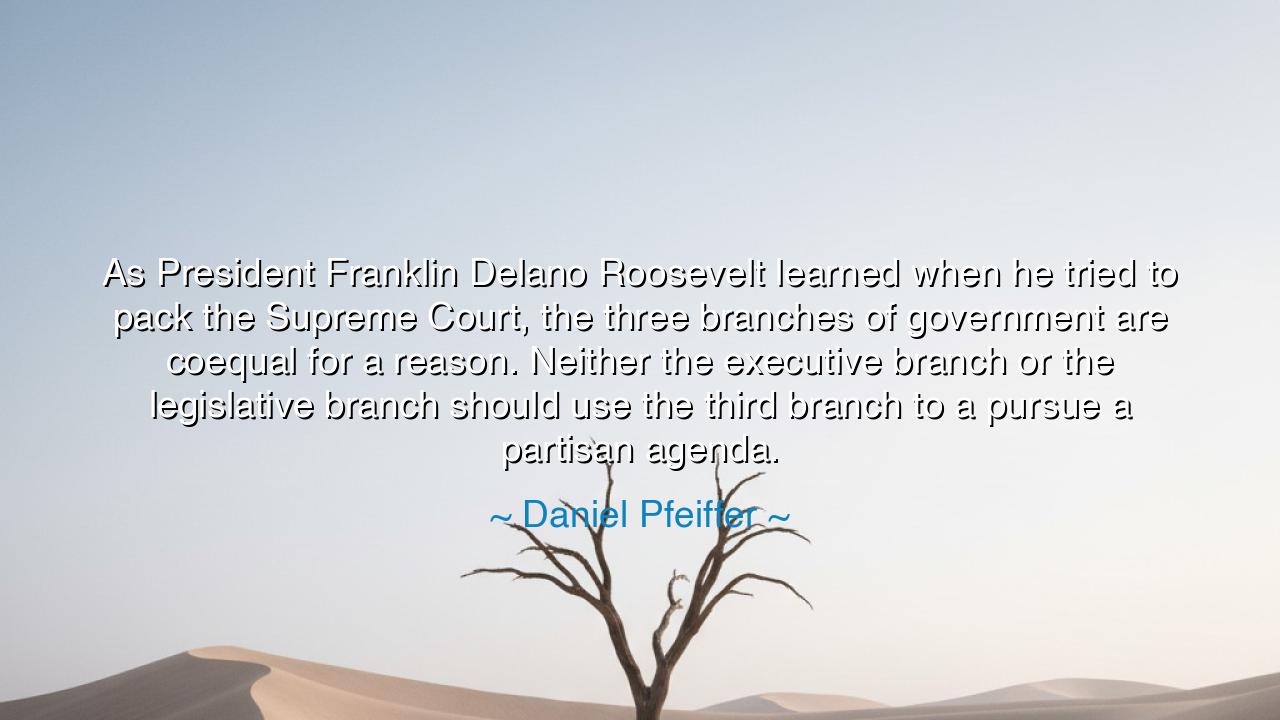
As President Franklin Delano Roosevelt learned when he tried to
As President Franklin Delano Roosevelt learned when he tried to pack the Supreme Court, the three branches of government are coequal for a reason. Neither the executive branch or the legislative branch should use the third branch to a pursue a partisan agenda.






When Daniel Pfeiffer declared, “As President Franklin Delano Roosevelt learned when he tried to pack the Supreme Court, the three branches of government are coequal for a reason. Neither the executive branch nor the legislative branch should use the third branch to pursue a partisan agenda,” he was reminding the world of a sacred truth — that balance is the heartbeat of freedom. His words, though spoken in the modern age, echo the wisdom of the ancients who knew that unchecked power, even in noble hands, breeds corruption. Pfeiffer, once a close adviser to President Barack Obama, spoke not merely as a politician but as a guardian of principle — warning that the separation of powers is not a technicality, but the very architecture of liberty itself.
The origin of this quote lies in reflection upon a historical moment that shook the American republic: President Franklin D. Roosevelt’s attempt to “pack” the Supreme Court in 1937. At the height of the Great Depression, Roosevelt had enacted sweeping reforms under his New Deal, programs designed to restore the economy and uplift the suffering. Yet, the Supreme Court, led by conservative justices, struck down several of these measures as unconstitutional. Frustrated by what he saw as judicial obstruction, Roosevelt proposed expanding the Court to add more justices sympathetic to his agenda. Though his motive was cloaked in legal reasoning, the public saw it for what it was — an attempt to bend the judiciary to executive will. The backlash was fierce, and even his allies recoiled. Roosevelt’s plan failed, but the lesson endured: the independence of the judiciary must never be sacrificed to the ambitions of politics.
Pfeiffer’s reflection upon that event serves as a timeless warning — that when any branch of government seeks to dominate the others, democracy itself begins to decay. The three branches — executive, legislative, and judicial — were designed by the Founders not to compete for supremacy, but to restrain one another in harmony. Each is a pillar of justice; together they uphold the temple of the republic. Remove or weaken one, and the entire structure begins to tremble. Pfeiffer’s words remind us that to weaponize the courts for partisan gain is to turn the scales of justice into tools of oppression, and to trade the rule of law for the rule of faction.
History has shown what happens when this balance is broken. In ancient Rome, the Republic collapsed when the Senate, the Consuls, and the Tribunes ceased to respect their limits. Julius Caesar, under the pretext of reform, concentrated all powers into his hands, believing that only he could guide Rome to stability. But his victory was Rome’s undoing. The Republic gave way to empire, and with it, liberty fell into shadow. The Founding Fathers, mindful of this history, built a system of checks and balances precisely to prevent such tyranny. Pfeiffer’s warning, therefore, is not merely political — it is civilizational. It speaks to the eternal truth that power must be divided if it is to remain just.
The emotional heart of Pfeiffer’s statement lies in his recognition that partisanship is the enemy of justice. The courts are meant to be the nation’s conscience — impartial, deliberate, and above the storms of politics. When the judiciary becomes a battlefield for ideology, the people lose faith in its verdicts, and the law itself becomes tainted. It is easy to cheer when the courts favor one’s side, but the wise understand that a weapon forged for one faction will one day be turned against another. The abuse of the judiciary, no matter who commits it, is the slow poisoning of the republic’s soul.
Yet, Pfeiffer’s tone is not despairing — it is admonitory and hopeful. His call is for citizens and leaders alike to remember the purpose of government: service, not supremacy. The branches must contend, yes, but within the boundaries of honor and restraint. The executive must not command the courts; the legislature must not manipulate them; the judiciary must not legislate from the bench. Each must serve its proper sphere, guided not by partisanship but by principle. For in that delicate tension lies the strength of a free people.
The lesson of Daniel Pfeiffer’s words is both moral and practical: guard the independence of every institution that protects liberty. Do not be seduced by those who promise swift victories by undermining the balance of power. Justice gained through force is justice soon lost. Citizens must remain vigilant — questioning, informed, and unafraid to challenge even those they admire when they trespass against the boundaries of power. To preserve freedom, one must love truth more than tribe, law more than party, and country more than victory.
So let this teaching endure for future generations: the strength of a republic lies not in the might of one branch, but in the harmony of all three. The executive leads, the legislature represents, and the judiciary guards. When each honors its sacred duty, the people remain free. But when one seeks dominion over the others, the republic begins to die — not in flames, but in silence. Therefore, let the wise remember: justice must never serve politics, for politics must always serve justice.






AAdministratorAdministrator
Welcome, honored guests. Please leave a comment, we will respond soon